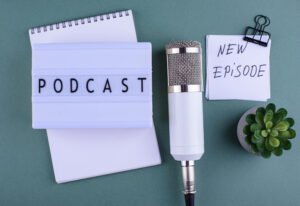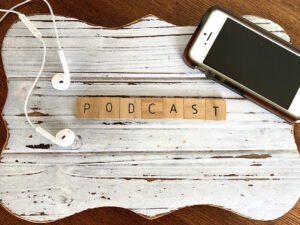How to Start a Podcast
Digital audio and recordings that may be downloaded or broadcast over the Internet are known as podcasts.
What is a Podcast?
 Podcasting is a great medium for both listeners and artists because it’s easy to utilize for both parties. There are various options for podcasters who want to launch their own show.
Podcasting is a great medium for both listeners and artists because it’s easy to utilize for both parties. There are various options for podcasters who want to launch their own show.
Unlike traditional radio and television stations, several podcasting services enable users to contribute their own content.
Podcasts can be found on various streaming services, including Spotify, Stitcher, iTunes, Google Podcasts, and Apple Podcasts (the podcast app that comes with iOS).
How to make a podcast
 Creating, recording, editing, and distributing a high-quality podcast takes time. Take a look at these general guidelines for creating a podcast.
Creating, recording, editing, and distributing a high-quality podcast takes time. Take a look at these general guidelines for creating a podcast.
Decide on your topic and objectives
Select a podcast topic that is relevant to your interests and abilities. Make a list of your objectives for creating a podcast. Podcasters produce material for various objectives, including brand awareness, audience engagement, and knowledge sharing about a topic that is important to them.
Listen to other podcasts on the same subject
Discover the best podcasts on the subject of your choice. Find out what content works best for your audience by listening to episodes and reading reviews.
Decide on a format.
Podcasts are available in several genres, including interviews, monologues, fiction, and nonfiction stories. Determine the number of podcast episodes and the duration of each episode that you wish to produce in your first season. You can either go solo with your podcast or have a co-host.
Pick a title.
Choose a podcast name after you’ve established your format. Keep things simple. Include important keywords that can help new listeners find your podcast based on its name and boost search engine optimization (SEO).
Create a storyboard or outline
Depending on how your podcast is set up, you may want to include some episode notes. Unstructured interviews can nevertheless benefit from an outline of talking topics to help keep the conversation on track. The start and outro of your show should include a call for feedback and subscriptions from new listeners.
Gather all the necessary supplies
You’ll need a microphone, a pop filter, and headphones, among other things. Additionally, you’ll need audio recording and editing software to produce your audio content.’ Several free audio editing apps may be found online.
Set up a recording studio
Set up your podcast recording equipment in a quiet area of your home. Cushions, drapes, and rugs absorb echoing reverberations, reducing the quality of vocal audio.
 Make a podcast recording.
Make a podcast recording.
Begin recording your first episode by consulting your show notes. If you’re just starting as a podcaster, getting used to the microphone can take some time. Water and breaks are essential for keeping your body hydrated
Make adjustments to your audio.
Begin by removing any extraneous content. Edit out rambling passages to keep your podcast focused on your topic. Consider reordering pieces to make the episode’s narrative thread as evident as feasible. Any sound quality issues you detect during listening can be removed or fixed during postproduction.
Create your cover
Make sure your podcast is ready for distribution. Write a concise summary of your show that incorporates SEO-friendly keywords. Create your cover art, or hire a professional graphic designer to help you. Keep in mind that podcast cover art can be anywhere from 1400×1400 pixels to 3000×3000 pixels in size.
Use a podcast hosting
Service to upload your audio recordings. Podcast hosting platforms save your audio files and provide an RSS podcast feed with a link to your podcast. Buzz sprout, Castors, and Anchor are three prominent podcast hosting services.
Submit podcast
If you haven’t already done so, submit your podcast-to-podcast directories. Use your new podcast’s RSS feed URL to submit your show to podcast directories like Spotify, Apple Podcasts, Google Podcasts, and Stitcher, amongst others.
Promote your podcast on social media
Make a website for your podcast and promote it on social media. Find online communities linked to your podcast’s theme and join them. Invite other podcasters to co-host an episode if their interests are similar. Stay consistent with your release schedule and get innovative with how you reach out to potential podcast listeners. Above all, upload fresh episodes regularly to expand your listening base.
Get In Touch
We’d love to discuss your project or world-beating idea with you.
Send us your details and we’ll schedule a Free Strategy Session.
Your session will include recommendations on Business Processes, Marketing Consulting, and any other requests to help accomplish your goals.
The advantages of Podcasting
 You now have a new way to reach out to your audience, thanks to the podcasting world. People are addicted to podcasts because they offer a convenient method to absorb knowledge with little effort.
You now have a new way to reach out to your audience, thanks to the podcasting world. People are addicted to podcasts because they offer a convenient method to absorb knowledge with little effort.
Easy to use
No one will be too busy to listen or miss out on the information you’re providing if you use Podcasting. The convenience of Podcasting is that it allows users to download and playback episodes at their convenience. It doesn’t matter if you’re jogging, driving, working, or just resting while listening to a podcast episode.
Not expensive
The more popular your podcast becomes, the more money you should put into improving the quality. Although, if you’re just getting started, it’s quite straightforward. All you’ll need is a computer, laptop, or smartphone, software, and an adequate internet connection. Later on, I’ll go through the equipment specifics you’ll need, but the above is an excellent place to start. Record, talk, edit, and publish it on your preferred platform.
Increase the amount of traffic audience
Like any other kind of content, Podcasting can help you reach out to new audiences by increasing familiarity. Listeners are more likely to subscribe to a podcast they enjoy listening to regularly. Your audience will likely continue to listen if you remain consistent. Your dedicated audience may then suggest your podcast to others, which has a knock-on effect. As a result, it expands your reach and can quickly lead to increased traffic and lead creation.
Increase your brand’s authority
It makes no difference whether you’re the first in your business to launch a podcast or the latest in a long line of companies to do so. Podcasts can assist you in establishing your authority. You become the go-to individual listeners want to hear from and chat to when you provide consumers more opportunities to consume your content and hear from the experts on your team.
Conclusion
Using the podcast musical theme at both the start and finish of your podcast can help maintain a sense of continuity between episodes. This audio theme could include a catchphrase or a motto that listeners would subconsciously incorporate. They might like it so much that it becomes their heaven, like music to their ears. It’s up to you to create this haven for them.
FAQS
1) What is Podcasting?
Digital audio and recordings that may be downloaded or broadcast over the Internet are known as podcasts. Podcasting is a great medium for both listeners and artists because it’s easy to utilize for both parties. There are various options for podcasters who want to launch their own show. Unlike traditional radio and television stations, several podcasting services enable users to contribute their own content.
2) What are the advantages of using podcasts?
- Easy to use
- Not expensive
- User familiar
- Increase audience
3) What is the importance of using podcasts?
Using the podcast musical theme at both the start and finish of your podcast can help maintain a sense of continuity between episodes. This audio theme could include a catchphrase or a motto that listeners would subconsciously incorporate. They might like it so much that it becomes their heaven, like music to their ears. It’s up to you to create this haven for them.
